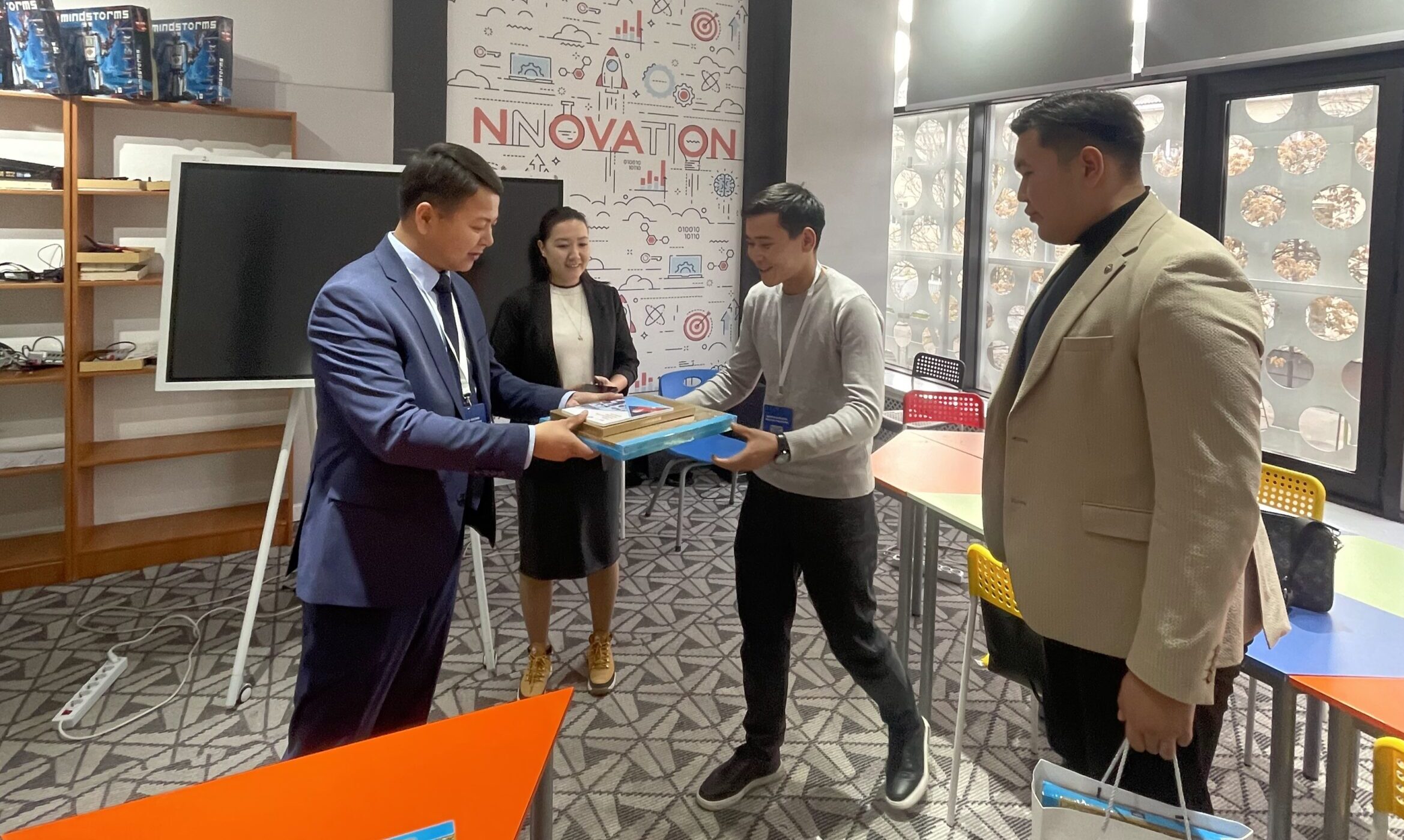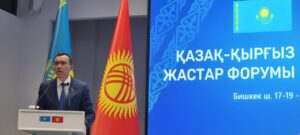BISHKEK – A delegation from Kazakhstan, led by Maulen Ashimbayev, the Chairperson of the Senate, an upper chamber of the Kazakh Parliament, participated in the Kazakh-Kyrgyz Youth Forum in Bishkek on Nov. 17-19. The forum focused on the youth’s role in strengthening relations between the two countries, artificial intelligence (AI), and the creative industry.

A delegation from Kazakhstan, led by Maulen Ashimbayev, the Chairperson of the Senate, an upper chamber of the Kazakh Parliament, participated in the Kazakh-Kyrgyz Youth Forum in Bishkek on Nov. 17-19. Photo credit: The Astana Times.
The forum aimed to unite young people from both countries, fostering the exchange of ideas, support, and recognition of young citizens’ achievements across various fields. It also sought to identify and address urgent problems faced by the youth.
Addressing the forum participants, Ashimbayev outlined the historical aspects of the friendly relations between the two countries, emphasizing the importance of preserving the connection across generations.
“The relations between the two countries’ leaders, based on brotherhood and trust, greatly strengthen cooperation in all areas. Our common task is to fortify the friendship of the new generation, our youth,” he said.

National Volunteer Network of Kazakhstan presented a collection of the best volunteer practices in the country to colleagues from the Kyrgyz Republic during the Kazakh Kyrgyz Youth Forum. Photo credit: The Astana Times.
According to Ashimbayev, the ability to unite and collectively address common challenges in modern geopolitical instability is crucial. Understanding the common centuries-old history and learning from it is essential to achieve this.
In turn, Nurlanbek Shakiyev, the Chairman of the Jogorku Kenesh (Parliament) of the Kyrgyz Republic, highlighted the significant role of youth in implementing social, political, and economic reforms, noting that many young individuals are contributing to various fields and achieving success.

Ashimbayev outlined the historical aspects of the friendly relations between the two countries, emphasizing the importance of preserving the connection across generations. Photo credit: The Astana Times.
He asserted that young people are the future, emphasizing the importance of preserving ancestral values, particularly their native language, alongside mastering modern technologies.
Commencing the first-panel session, Almas Ishimbayev, founder of an IT company in Bishkek, delved into the topic of AI, highlighting the emergence of Ghat GPT and distinguishing between generative artificial intelligence and non-generative.
“Non-generative means when AI generates information, utilizing existing data without creating new content, extracting information from the internet and delivering it in a millisecond. However, generative AI is an intelligence that creates something new from existing information. It processes information from various sources, recognizes it from the internet, and presents us with something innovative,” he said.

Adilkhan Kopabay, Chairman of the Board of the Situational Analytical Center of the Fuel and Energy Complex of Kazakhstan, showcased their AI project, MoonAI. Photo credit: The Astana Times.
Despite the notion that AI has the potential to replace humans entirely, Ishimbayev emphasized that its dependence on humans will persist for the next decade. This is because AI still learns based on existing information and needs to understand concepts like marketing, morality, and the intricate patterns of human lives.
“I believe that AI will not replace people in their positions, but individuals who know how to use AI will replace those who do not. Nevertheless, we must acknowledge that AI is a part of our lives, and everyone should learn how to use it for the greater good and adapt to its integration,” he said.
Adilkhan Kopabay, Chairman of the Board of the Situational Analytical Center of the Fuel and Energy Complex of Kazakhstan, showcased their AI project, MoonAI, during which he demonstrated its practical applications in the country’s energy industry.
Kopabay illustrated how the tool can provide forecasts for the actual use of energy over 24 hours and predict oil prices for three years. Significantly, the tool addresses the critical challenge of predicting emergencies in Kazakhstan.
“Our product incorporates comprehensive data on oil, gas, energy, and uranium residues. We have designed key dashboards tailored to our leadership’s needs, focusing on efficiency and integration with the Ministry of Emergency Situations. The tool offers real-time insights, and the data is dynamic, providing a visual representation of the region’s plan and deviations,” he said.
Discussing the role of AI, Kopabay emphasized that it is more about the accuracy percentage and proposals. While acknowledging that AI can occasionally make incorrect predictions, he stressed that its reliability depends on many data points. He likened it to predicting snowfall, where different metrics may not align but should be correlated for accuracy.
The event also featured discussions of engaging young individuals in creative pursuits, supporting youth-led initiatives and social projects, exchanging insights into entrepreneurship and youth volunteering, and endorsing startups and projects that utilize AI innovatively.

